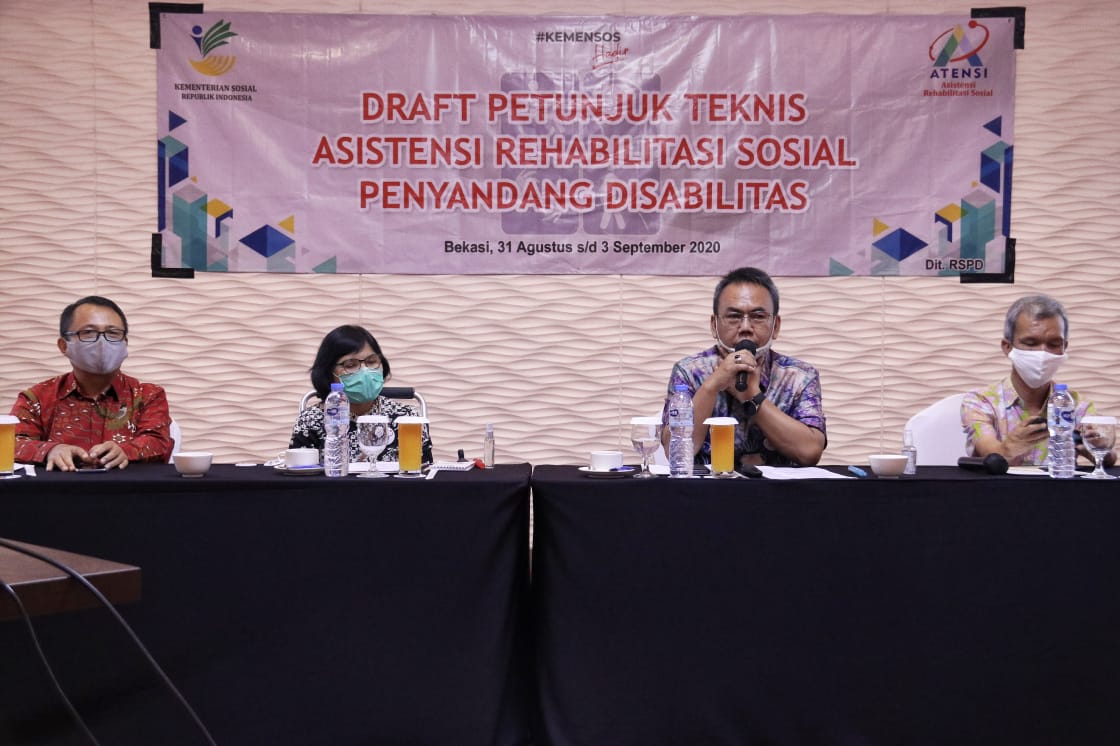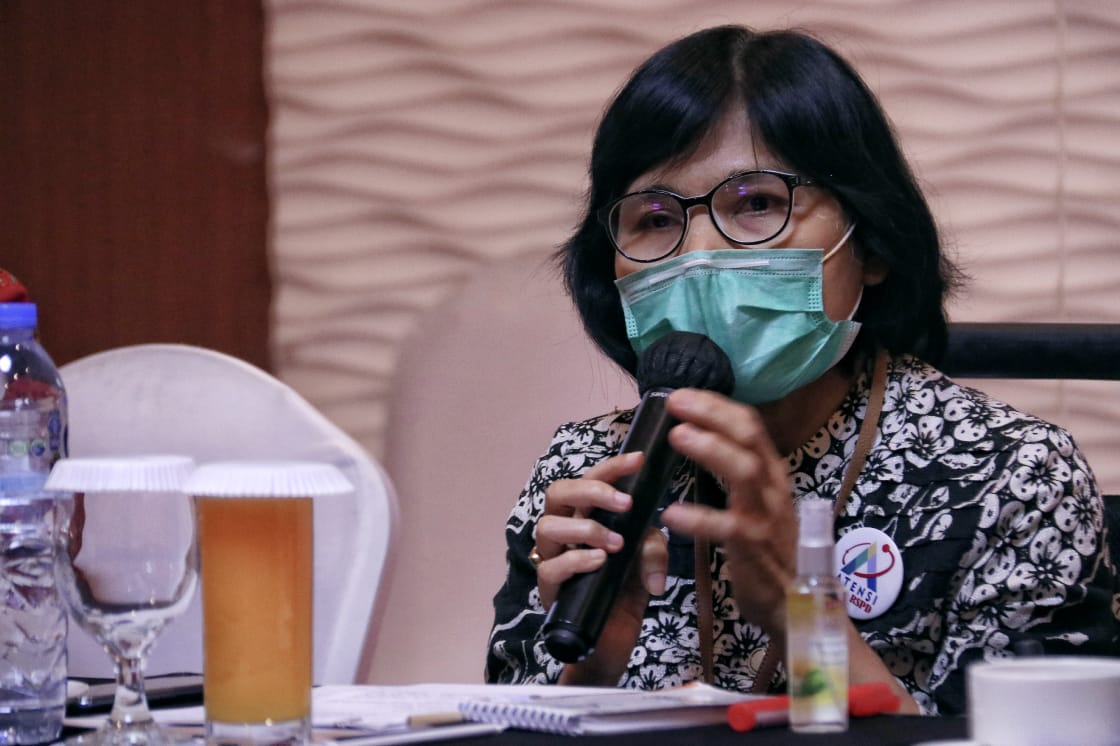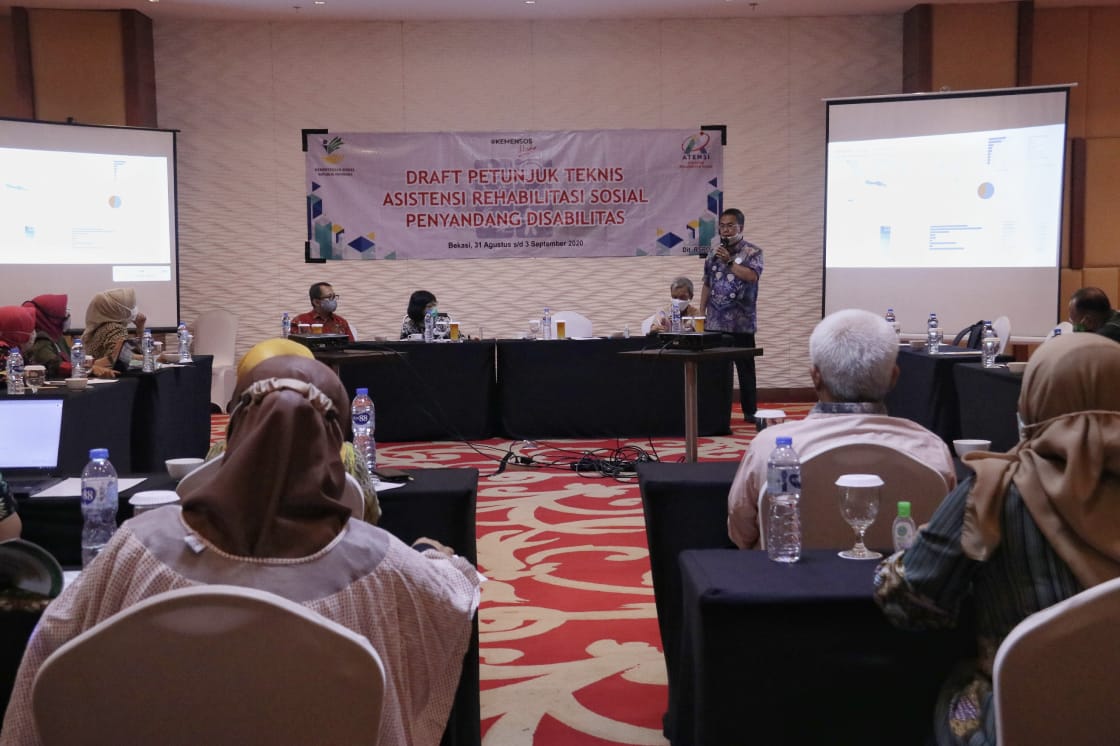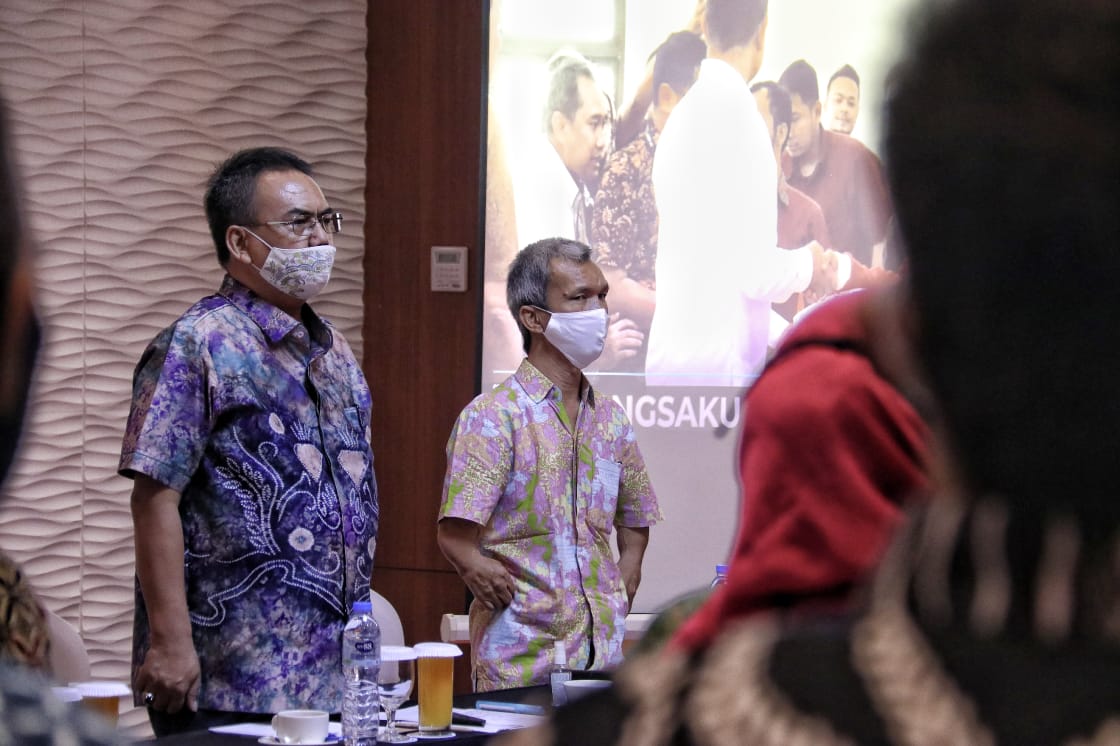BEKASI (September 1, 2020) - The Ministry of Social Affairs Republic of Indonesia through the directorate general of social rehabilitation affirms honoring commitments, granting rights and protection to those with disabilities by formulating the operational guidelines of the Social Rehabilition Assistance (ATENSI) for Person with Disabilities. This was conveyed by the Director General of Social Rehabilitation Harry Hikmat at the activity of preparing the Draft Operational Guidelines for Social Rehabilitation Assitance for Person Disabilities organized by the Directorate of Social Rehabilitation of Person with Disabilities.
Harry conveyed that operational guidelines for the Social Rehabilitation Assistance for Persons with Disabilities should be compiled, not technical guidelines, because from the operational guidelines it is possible to have technical guidelines such as specific modules, depending on the variety of disabilities and sub-types of disabilities. The preparation of the these guidelines is the task of the Ministry of Social Affairs through the Directorate of Social Rehabilitation of Persons with Disabilities (Dit. RSPD).
According to Harry, in the Ministry of Social Affairs there are 5 clusters of Social Welfare Service Recipient (PPKS) for the Social Rehabilitation Program, namely Drug Abuse Victims, Elderly, Persons with Disabitities, Children (Abandoned Toddlers, Abandoned Children, ABH, AMPK), Person with Social Deviance Issues and Victims of Trafficking in Persons. The population oh people with disabilities is 30.4 million people based on the results oh the 2018 National Socio-Economic Survey (Susenas).
Harry hopes the long form population census to be carried out by the Central Statistics Agency (BPS) in 2021 will provide an overview of the population of people with disabilities.
“In the operational guidelines, data describing the current situation and condition of persons with disabilities can be included, not only qualitatively, because these operational guidelines are the baseline for the initial year of ATENSI journey,” said Harry. It is important to explain the diversity of disabilities at the beginning to provide an overview of the diversity of disabilities conditions that require policy responses, programs and activities that are in accordance with needs.
"If possible, the operational guidelines also describe the differentiation of habilitation and social rehabilitation because in terms of eligibility criteria, it will use a life cycle approach, not only segmentation in the adult age group (15 years and over), but from an early age," said Harry. The facts prove that if the social rehabilitation process for persons with disabilities is carried out at an adult age, the capabilities are not optimal. People with disabilities should be habituated at an early age so that the capabilities achieved can be optimal.
Harry emphasized the need to create special operational guidelines for social habilitation to respond to the needs and capacity building of persons with disabilities who have experienced disabilities from an early age.
"We must have a glossary on the variety of disabilities, so that they are not interpreted differently by many parties. This guideline must be firm, because we refer to the law, use a variety of disabilities with a nomenclature that is in accordance with the Law on Persons with Disabilities," said Harry.
According to Harry, Pusdatin has prepared the SIKS-NG Business intelligence Dashboard for Persons with Disabilities, the database of which is from DTKS. DTKS has adjusted its categories according to the variety of disabilities in Law No. 8 of 2016 on persons with disabilities. "Dashboards for Persons with Disabilities should be included in operational guidelines with numbers or percentages to provide an overview of the baseline, so that there is an analysis, for example distribution based on various disabilities," said Harry.
To obtain registered national data, all disabilities will be prepared using an online system (self register). The Ministry of Social Affairs has prepared an eKPD (Electronic Disability Card), where civil rights and family cards can be registered, and basic saving account features and wallet features such as health and transportation can be included.
Harry explained the policy direction of the social protection and rehabilitation program in accordance with the Convention on the Rights of Persons with Disabilities (CRPD), namely respecting, fulfilling and protecting the rights of persons with disabilities. The Ministry of Social Affairs places to respect (respect, recognition), to fullfill (fulfillment of basic rights) and to protect (protection against risks that occur) as the main commitment. "The rights approach in social work practice is the spirit in these guidelines, not the welfare approach," said Harry.
The next policy is strengthening the integrated social rehabilitation system with social security, social empowerment and social protection, expanding the reach of family, community and residential-based social rehabilitation, strengthening the capacity and institutions of Social Rehabilitation Center and Social Welfare Institutions. Then, increasing the campaign for prevention, rehabilitation, empowerment, social security and protection in all sectors and the community, increasing the role of local governments, the community and the private sector in social services.
These various policies are carried out through Social Rehabilitation Assistance (ATENSI) by strengthening the performance of Social Rehabilitations Center in implementing family, community and residential-based social rehabilitation, renovating Social Rehabilitation Center, providing infrastructure facilities for Social Service Centers (SERASI), Piloting SERASI (ensuring PPKS basic rights are fulfilled and in protecting families through ATENSI services), national campaigns, Standardization of Social Rehabilitation Center, accreditation of social welfare institutions and certification of social rehabilitation assistants, and Contact center by providing a public complaint system through an integrated call center with complaints through online media, case management systems, DTKS PPKS, and public relations.
“In operational guidelines or in attachments, related laws and regulations can be attached, for example PPs on habilitation, social welfare and others. It is important in explaining the guidelines, that our orientation has changed quite significantly, such as from object to subject, Charity base to Human Rights base, independence without discrimination and multi-sectoral," said Harry.
The operational guidelines must contain the contents of relevant real actions from the relevant government regulations and explained in narrative form, especially key articles or attached tables that are relevant to the subject matter of the guidelines.
"Rehsos will be mostly engaged in social services, which can be integrated with various social assistance schemes and other programs," said Harry. Social Rehabilition Center play a strategic role in the expansion of social services for the population. For this reason, it is necessary to strengthen service and referral schemes, redefining the role of the center and regions and strengthening centers and linkages with social assistance and other programs, especially those related to health, education, employment and access to cooperative capital and community activity units.
“Rehsos assistance must cover all levels of socioeconomic status, because people with disabilities are in a position as a vulnerable group. Not all disabilities are poor, but it can be said that all disabilities have a level of vulnerability because they have the slightest limitations,” said the Director General of Social Rehabilitation.
“Our orientation is to social services, not to social assistance. Fight for people with disabilities to have access to regular programs, national priority programs, social safety net programs," explained the Director General of Social Rehabilitation.
According to Harry, the operational guidelines contain alternative scenarios and are not rigidly different from technical guidelines. The guidelines also contain a change in the service paradigm from sectoral/fragmentary social services, limited and exclusive coverage, based on volunteerism-based institutions/social institutions to become integrated and sustainable social services through Centrelink/SERASI, reaching all citizens and inclusive, comprehensive and standardized strategies, prioritizing roles and family and community responsibilities, services in institutions are temporary and based on professionalism.
"The best practices in the field, both from Social Rehabilitation Center, should be included in this guideline, so that the special characteristic of social rehabilitation for persons with disabilities emerge," concluded Harry.
 English
English
 Bahasa
Bahasa




